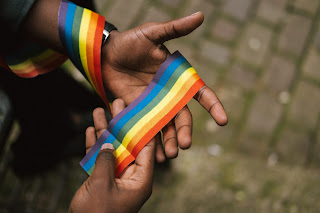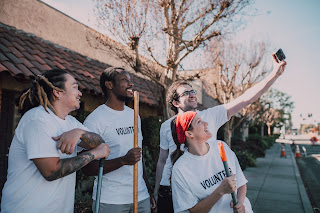Why is Pride Month So Important?
THIS MONTH IS IMPORTANT BECAUSE OF STRUGGLES WE SOMETIMES FORGET.
EVERYONE Deserves Respect. So Give to Others What You Expect.
 As the world turns with climate calamities and federal indictments of high profile people, you've probably also been keeping tabs on the media coverage around LGBTQIA+ Pride month, happening right now. It's wonderful that this month exists, especially since it is a celebration of advancement amidst chaotic challenges threatening to squander democratic rights. Sure, there has been wonderful progress made; however, as certain successes have come about, opponents still rise to annihilate the wonderful humanitarian connections that stand to make us all better. I'd like for you to understand that very clearly, Evolver. So that is the reason for me writing this post. How about we talk basics? Sure, many of you already know about the New York Stonewall Riots, and you may now be bored with and feel distant from that historical fundamental narrative. Thus, before taking sides and accepting division among all of God's children, perhaps read on as I attempt to get you to understand the relevance of this Pride month in the context of current national and global occurrences.
As the world turns with climate calamities and federal indictments of high profile people, you've probably also been keeping tabs on the media coverage around LGBTQIA+ Pride month, happening right now. It's wonderful that this month exists, especially since it is a celebration of advancement amidst chaotic challenges threatening to squander democratic rights. Sure, there has been wonderful progress made; however, as certain successes have come about, opponents still rise to annihilate the wonderful humanitarian connections that stand to make us all better. I'd like for you to understand that very clearly, Evolver. So that is the reason for me writing this post. How about we talk basics? Sure, many of you already know about the New York Stonewall Riots, and you may now be bored with and feel distant from that historical fundamental narrative. Thus, before taking sides and accepting division among all of God's children, perhaps read on as I attempt to get you to understand the relevance of this Pride month in the context of current national and global occurrences.
 Even though the United States labels itself as the great melting pot of the world and the land of the free, recent years have illustrated how race relations, classism, sexual orientation, personal values, and personal identities sit at the root of divisiveness and power struggles. Some people feed into this as fuel for their hateful passion to alienate others. But many other folks go on to evolve and think higher. They move in ways that educate and inform others. They shed light on truth and spawn new ways of thinking. These people bring about opportunities to learn and grow for the better. So, here goes, my friend. I'd like to share with you why this Pride month is so important, simply by explaining the struggles LGBTQIA+ people have been facing via discrimination and marginalization.
Even though the United States labels itself as the great melting pot of the world and the land of the free, recent years have illustrated how race relations, classism, sexual orientation, personal values, and personal identities sit at the root of divisiveness and power struggles. Some people feed into this as fuel for their hateful passion to alienate others. But many other folks go on to evolve and think higher. They move in ways that educate and inform others. They shed light on truth and spawn new ways of thinking. These people bring about opportunities to learn and grow for the better. So, here goes, my friend. I'd like to share with you why this Pride month is so important, simply by explaining the struggles LGBTQIA+ people have been facing via discrimination and marginalization.
- Legal Discrimiation: In the United States and various countries worldwide, LGBTQIA+ individuals have historically faced legal discrimination. Laws that criminalized same-sex relationships, restricted LGBTQIA+ rights, and denied equal protection were prevalent. Although many of these laws have been repealed or struck down, legal inequalities still exist, such as restrictions on adoption, employment discrimination, and limited legal recognition of same-sex relationships in some jurisdictions.
- Social Stigma and Prejudice: LGBTQIA+ people have faced pervasive social stigma and prejudice, leading to various forms of discrimination, harassment, and violence. Homophobia, transphobia, and biphobia have manifested in both overt and subtle ways, negatively impacting the mental and physical well-being of individuals within the community. These prejudices have also led to social exclusion, strained family relationships, and limited access to healthcare and other essential services.
- Violence and Hate Crimes: LGBTQIA+ individuals have been subjected to targeted violence and hate crimes. Assaults, harassment, and even murder based on a person's sexual orientation or gender identity have been widespread. Transgender people, particularly transgender women of color, face an alarmingly high risk of violence and murder.
- Lack of Legal Protections: Even with progress in legal recognition, many countries lack comprehensive legal protections for LGBTQIA+ individuals. In some places, there are no laws explicitly protecting them from discrimination in areas such as employment, housing, healthcare, and education. This leaves many vulnerable to mistreatment and unequal treatment under the law.
- Access to Healthcare: LGBTQIA+ individuals often face barriers when accessing healthcare. Discrimination by healthcare providers, lack of culturally competent care, and limited access to gender-affirming healthcare, including gender-affirming surgeries and hormone therapies, have been significant challenges. This can negatively impact their physical and mental well-being.
- Mental Health Issues: Members of the LGBTQIA+ community have higher rates of mental health issues, including depression, anxiety, and suicidal ideation, compared to the general population. These challenges can be attributed to various factors, including social stigma, discrimination, rejection by families and communities, and the stress of concealing one's identity.
- Global Hindrances: The struggles faced by LGBTQIA+ individuals vary significantly across countries. While progress has been made in some regions, others still maintain oppressive laws and social attitudes that target and discriminate against LGBTQIA+ people. In some cases, same-sex relationships are criminalized, and individuals can face severe penalties, including imprisonment or even the death penalty.
Again, I feel that it's important to note that while these struggles exist, progress continues to be made through advocacy, education, and legal reform. But that takes hard work as many organizations and individuals are working tirelessly to promote equality, inclusivity, and human rights for LGBTQIA+ people around the world. Yet, freedome of expression to exist in truth and authenticity should just . . . be.
I hope you enjoyed this article. I also hope it has inspired you. PLEASE SHARE AND LET ME KNOW YOUR THOUGHTS! To know more about me and ways you can work with me, please visit DAYMONDCO.COM.
#BeYourBestYOU #EvolveWithMe
XO
DAYMOND THE BRAND CLC
Brand & Life Coach Engineer



Comments
Post a Comment